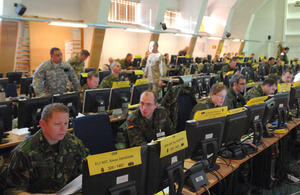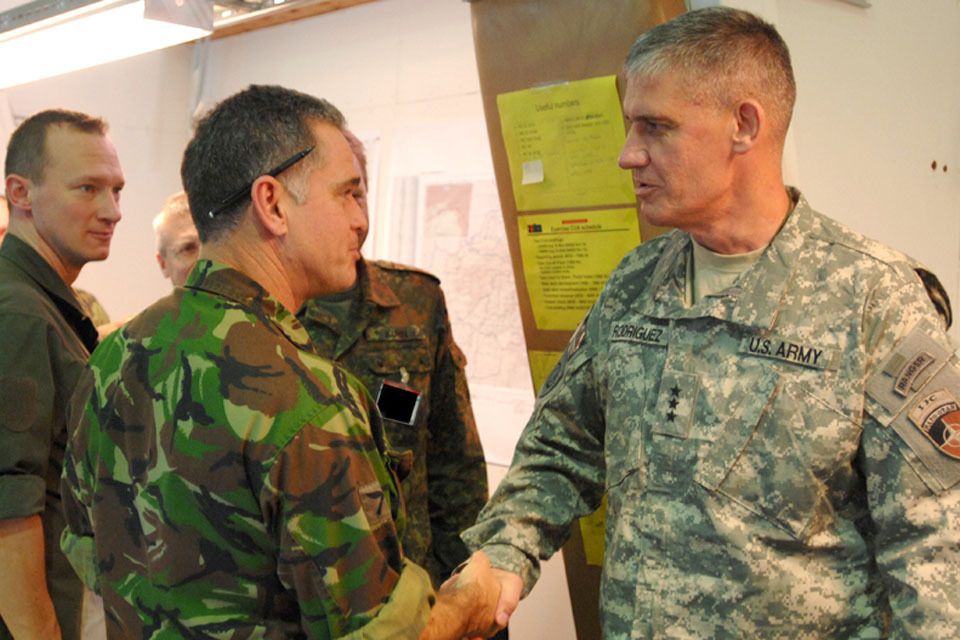ARRC prepares in Norway for deployment to Afghanistan
As part of their preparations for their deployment to Afghanistan next year personnel from Headquarters Allied Rapid Reaction Corps (HQ ARRC) recently participated in two weeks of high intensity, comprehensive training at NATO's Joint Warfare Centre in Stavanger, Norway.

Mission training in the Combined Joint Operations Centre on a busy day [Picture: Crown Copyright/MOD 2010]
Members of HQ ARRC will deploy to Afghanistan in early 2011 to augment ISAF Joint Command (IJC) in Kabul.
As part of their preparations around 200 ARRC personnel received state-of-the-art training from a team of well over 140 professional trainers, staff, and support personnel during what is termed a Mission Readiness Exercise, or MRE.
Designed to prepare deploying units for the experiences, events and operational tempo they can expect in theatre, the MRE conducted at the Joint Warfare Centre placed ARRC personnel in realistic situations and scenarios, involving everyone from the most junior to the most senior-ranking officers.
Often, a MRE is the last training opportunity for a unit to work together in a training environment before they must do everything for real. As such, it is critical for the unit’s personnel to receive tough, demanding training - the idea being that it is better for the personnel to make mistakes (and learn from them) in a training environment than in a combat zone, where mistakes can mean the difference between life and death.

Lieutenant Colonel Gavin O'Keeffe, Chief of Operations at the Combined Joint Operations Centre, meets Lieutenant General David Rodriguez, Commander ISAF Joint Command [Picture: Crown Copyright/MOD 2010]
The Joint Warfare Centre (JWC) was activated in late 2003 as part of the alliance transformation. Set up to conduct joint and combined experimentation and doctrine development, the JWC prepares NATO forces for military missions through joint and combined training events.
Major General Tim Evans, ARRC Chief of Staff, and soon to be Chief of Staff for IJC, was confident that the ARRC’s culminating pre-deployment exercise provided exceptional value for deploying personnel:
Having done our own internal training, it has given us the opportunity to look wider and have people from the outside look at us and train us … with the subject matter experts [from Afghanistan] and the organisation that does NATO training [the JWC]. It’s the outside looking in,” said Major General Evans.
The ARRC deployed once before to Afghanistan in 2006. This time, ARRC personnel are scheduled to augment the US Army’s 5th Corps, filling positions at IJC and at ISAF headquarters in Kabul.
French Army Colonel Charles Sevin, Director of Training at the JWC, was highly complimentary of the ARRC, specifically regarding their preparation for the MRE at Stavanger:
ARRC is a headquarters we usually train. We trained the ARRC prior to their last deployment to Afghanistan,” said Colonel Sevin.
ARRC has a good reputation - we were expecting that the officers and NCOs [Non-Commissioned Officers] would be well prepared, and that’s the case.
Another component of the unit’s training at the JWC was the addition of Individual Augmentees, or IAs.
Quite literally coming from around the globe, the November exercise brought well over 130 IAs to Stavanger to participate in the training event.
IAs were placed into nearly all offices, disciplines and planning teams for the duration of the MRE, a situation that brought ARRC personnel and IAs together to form new working relationships which will continue to strengthen as the deployment approaches.
Ultimately, it will be a key challenge and responsibility for ARRC personnel to blend with their new colleagues and form a tight, cohesive team in the headquarters at IJC.
Wishing to add as much realism and training benefit as possible, the JWC brought around 70 subject matter experts from IJC to Stavanger to assist with the training.
Representing nearly every deployed functional area and discipline, these experts offered ARRC personnel and the IAs invaluable experience, advice and information regarding the current state of affairs at IJC and in Afghanistan.
The most senior of this group was IJC’s current commander, Lieutenant General David Rodriguez. In an address to the training audience, he was quick to compliment both ARRC personnel and IAs preparing for deployment as well as the JWC staff who supported the many subject matter experts he brought to the training from Kabul.